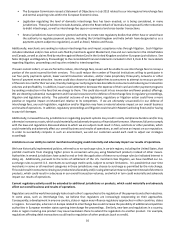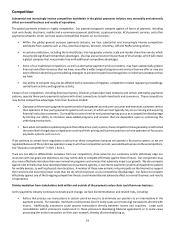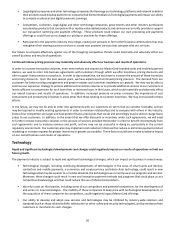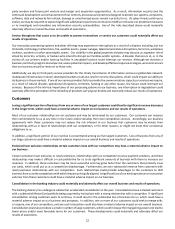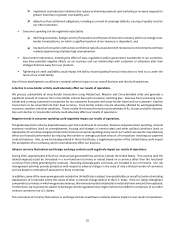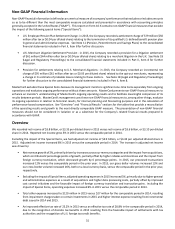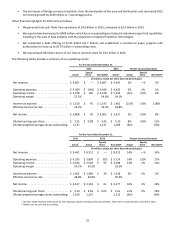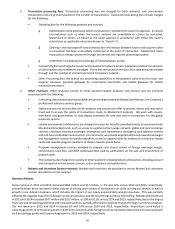MasterCard 2015 Annual Report Download - page 32
Download and view the complete annual report
Please find page 32 of the 2015 MasterCard annual report below. You can navigate through the pages in the report by either clicking on the pages listed below, or by using the keyword search tool below to find specific information within the annual report.26
Reputational Impact
Brand perception may materially and adversely affect our overall business.
Our brands and their attributes are key assets of our business. The ability to attract consumers to our branded products and
retain them depends upon the external perception of us and our industry. Our business may be affected by actions taken by our
customers that impact the perception of our brands. From time to time, our customers may take actions that we do not believe
to be in the best interests of our brands, such as creditor practices that may be viewed as “predatory”. Additionally, large digital
companies and other technology companies who are our customers use our network to build their own acceptance brands,
which could cause consumer confusion and decrease the value of our brand. Moreover, adverse developments with respect to
our industry or the industries of our customers may also, by association, impair our reputation, or result in greater regulatory or
legislative scrutiny. We have also been pursuing the use of social media channels at an increasingly rapid pace. Under some
circumstances, our use of social media, or the use of social media by others as a channel for criticism or other purposes, could
also cause rapid, widespread reputational harm to our brands. Such perception and damage to our reputation could have a
material and adverse effect to our overall business.
Account data breaches could adversely affect our reputation and results of operations.
We, our issuers and acquirers, merchants and other third parties process, transmit or store cardholder account and other
information in connection with payment cards and devices. In addition, our customers may sponsor (or we may certify as PCI-
compliant) third-party processors to process transactions generated by cards carrying our brands and merchants may use third
parties to provide services related to card use. A breach of the systems on which sensitive cardholder data and account information
are processed, transmitted or stored could lead to fraudulent activity involving cards carrying our brands, damage our reputation
and lead to claims against us, as well as subject us to regulatory actions. We routinely encounter account data compromise
events, some of which have been high profile, involving merchants and third-party payment processors that process, store or
transmit payment card data, which affect millions of MasterCard, Visa, Discover, American Express and other types of cardholders.
These events typically involve external agents hacking the merchants’ or third-party processors’ systems and installing malware
to compromise the confidentiality and integrity of those systems. Further data security breaches may subject us to reputational
damage and/or lawsuits involving payment cards carrying our brands. Damage to our reputation or that of our brands resulting
from an account data breach of either our systems or the systems of our customers, merchants and other third parties could
decrease the use and acceptance of our cards and other payment devices, as well as the trend toward electronic payments,
which in turn could have a material adverse impact on our transaction volumes, results of operations and prospects for future
growth, or increase our costs by leading to additional regulatory burdens being imposed upon us.
In addition to reputational concerns, while most of the lawsuits resulting from account data breaches do not involve direct claims
against us, we could face damage claims in various circumstances, which, if upheld, could materially and adversely affect our
results of operations.
Fraudulent activity could damage our reputation and encourage regulatory intervention, which could reduce the use and
acceptance of our cards and other payment devices.
Criminals are using increasingly sophisticated methods to capture cardholder account information to engage in illegal activities
such as counterfeiting or other fraud. Cards that use magnetic-stripe technology, the most widely-used payment technology in
the United States, continue to raise heightened vulnerabilities to fraud relative to other technologies due to the static nature of
the information on the magnetic stripe. Fraud is also more likely to occur in transactions where the card is not present, such as
online commerce, which constitutes an increasing percentage of transactions. In addition, as outsourcing and specialization
become commonplace in the payments industry, there are more third parties involved in processing transactions using our cards.
Increased fraud levels involving our cards, or misconduct or negligence by third parties processing or otherwise servicing our
cards, could lead to regulatory intervention, such as enhanced security requirements, as well as damage to our reputation, which
could reduce the use and acceptance of our cards or increase our compliance costs, and thereby have a material adverse impact
on our business.
Acquisitions
Acquisitions, strategic investments or entry into new businesses could disrupt our business and harm our results of operations
or reputation.
Although we may continue to make strategic acquisitions of, or acquire interests in joint ventures or other entities related to,
complementary businesses, products or technologies, we may not be able to successfully partner with or integrate them. In
addition, such an integration may divert management’s time and resources from our core business and disrupt our operations.


